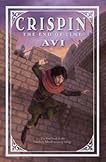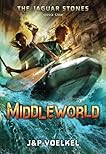About this article
Linda Buckley-Archer's top 10 time-travelling stories
This article was first published on guardian.co.uk at 10.00 BST on Wednesday 5 August 2009. It was last updated at 13.11 BST on Wednesday 5 August 2009.
The children's writer explores tales of journeys through time from HG Wells to Jeanette Winterson
In Linda Buckley-Archer's time-travelling adventure, Gideon the Cutpurse, two 21st-century children are lost in 1763. In its sequel, The Tar Man, an 18th-century villain wreaks havoc on 21st-century London. The trilogy concludes with Time Quake, in which a corrupt 18th-century aristocrat takes a fancy to contemporary New York. Appalled that the "bothersome little colony" has become a superpower, the villainous Lord Luxon resolves to sabotage the American War of Independence.
"My first proper short story was about a man obsessed with marking the new millennium (he missed it). Ever since, though I'm not sure why, the theme of time has managed to creep into almost everything I've written. We are so used to moving backwards and forwards in time in our heads - revisiting times past and speculating on our future - that the notion of time travel is easy to imagine and accept."
1. The Time Machine by HG Wells
It's impossible to leave out this seminal time-travelling story from of one of science fiction's founding fathers. Having invented a machine capable of moving through the fourth dimension, a gentleman scientist journeys to the distant future where he discovers that mankind has evolved in disturbing ways. Wells's imagination was extraordinary. Published in 1895 (10 years before Einstein's Special Theory of Relativity) The Time Machine reflects Wells's fascination with both science and social issues.
2. A Connecticut Yankee in King Arthur's Court by Mark Twain
Predating The Time Machine by five years, Twain's novel about Hank Morgan, a plain-speaking American who finds himself in an age of chivalry in the court of King Arthur, is still laugh-out-loud funny.
3. Orlando by Virginia Woolf
It's difficult to pin down Woolf's "biography" which is at once satirical and playful (with time, sexuality and literary form) as well as being a love letter (to Vita Sackville West). There's a joie de vivre in the writing that is just lovely. Anyway, who could fail to fall for Orlando? With "eyes like drenched violets" he/she starts life as a shapely-legged Elizabethan nobleman, changes sex around the early 1800s, marries a sea captain and is last seen as a writer, circa 1928.
4. Dirk Gently's Holistic Detective Agency by Douglas Adams
I was a student when I first heard Hitchhiker's Guide to the Galaxy on Radio 4 and recall rushing round to a friend's flat exclaiming "switch the radio on!" Douglas Adams is sorely missed and I often wonder what he would have been writing now. In this comic-sci-fi-fantasy-detective novel, Adams's wild plotting draws on quantum physics, Coleridge, not to mention a time machine that stops working when the telephone is mended, in order to prove the fundamental interconnectedness of all things.
5. The House on the Strand by Daphne Du Maurier
In this rare example of chemically induced time travel, a man finds it increasingly difficult to resist journeying back to 14th-century Cornwall. From the opening paragraph Du Maurier sweeps you along in a vivid narrative. No one tells stories or creates atmosphere better. The novel features Kilmarth, the house on the Cornish coast where Du Maurier spent the last years of her life.
6. Tom's Midnight Garden by Philippa Pearce
Tom is bored and in quarantine at his uncle and aunt's flat. One night he discovers that when the clock strikes 13 he is able to enter a sunlit garden where he meets Hatty. Soon he realises that he has somehow stumbled into the 19th century and that with each successive visit Hatty is a different age. In this beloved children's classic, Pearce explores questions about time and childhood and longing in prose which is often poignant and beautiful.
7. Van Loon's Lives by Hendrik Willem van Loon
Published in the US in 1942 (and with a moving dedication to his suffering homeland), Dutch writer and illustrator Van Loon describes a series of dinner parties given for the A-List of history. The perfect illustrations have great captions, too - "It was Leonardo, coming down in his glider" or "Thomas Jefferson tried out my best fiddle". To be consumed in small mouthfuls, it is full of whimsy, charm and humour. Ripe for reprint.
8. Tanglewreck by Jeanette Winterson
You can instantly sense the fun Jeanette Winterson had researching and writing this children's book, which features, among other things, an orphaned heroine called Silver, woolly mammoths, a rabbit called Bigamist and an evil woman who sees Time as big business. The pace is furious and the story teems with ideas, flights of fancy, and references to quantum physics.
9. Making History by Stephen Fry
Time travel novels generally fall into two categories. The first is a kind of time tourism during which great care is taken not to alter the past for fear of future consequences. The second involves yanking open the lid of Pandora's box and has characters tampering with the past for a bespoke future. Worth reading simply for the pleasure of being in the company of Stephen Fry's ever-probing mind, Making History takes the counterfactual approach and asks: What If Hitler had never been born?
10. How To Build a Time Machine by Paul Davies
Last but not least, a work of non-fiction to persuade you that you don't have to suspend your disbelief entirely when reading time-travelling stories. This is eminent physicist Professor Paul Davies's response to the question: Is time travel scientifically possible? Accessible and utterly fascinating.
Subscribe to:
Post Comments (Atom)































No comments:
Post a Comment